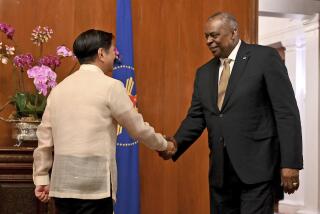Pentagon Fears Stalemate With Filipino Rebels
- Share via
WASHINGTON — Philippine Communists could be strong enough to fight the pro-American government of President Ferdinand E. Marcos to a “strategic stalemate” within three or four years and could possible topple the regime by the end of the decade, a top Pentagon official said Tuesday.
Describing the situation as urgent, Richard L. Armitage, assistant secretary of defense for international security affairs, called on a House subcommittee to approve a Reagan Administration request for sharply increased aid for the island nation, where the United States maintains two of its most important overseas military bases.
Armitage said the Communist New People’s Army now has as many as 15,000 men in arms, up 20% to 50% over the last year, and could draw on a popular base of as many as 1 million sympathizers. He said the rebel group is fighting government forces in 63 of the country’s 73 provinces, has agents in the 10 others and maintains either significant influence or control in at least one third of the country’s barangays, a political unit roughly similar to a U.S. precinct.
Without “substantial military assistance,” Armitage predicted, the Philippine armed forces “may become incapable of defeating the Communists.”
Outlining a “worst case” scenario, Armitage said the insurgents could take control of the country “by the end of the decade” if nothing is done to improve the fighting capability of the Philippine military, demoralized by at least a decade of corruption, bad leadership and poor logistical support.
The Reagan Administration is asking Congress to increase Philippine military and economic aid by $48 million next year, to $275 million. Armitage asserted that Manila’s military is on the defensive because it lacks such basic equipment as spare parts, trucks and communications gear, which it needs to search for the guerrillas.
He said that in recent months, the rebels have begun openly campaigning for the defection of government soldiers and have begun a campaign they call agaw-armas --literally, the grabbing of arms--from the military.
The Administration has moved to ease its once-cozy ties with Marcos since the August, 1983, assassination of Philippine opposition leader Benigno S. Aquino Jr., which ignited a storm of anti-government indignation and dramatically weakened Marcos’ grip on power.
However, a coalition of American and Philippine activists has urged an end to all U.S. assistance to Marcos and released what they said is an internal Administration document that warns against allowing the United States to get caught “between the slow erosion” of Marcos’ dictatorial control and the growing power of anti-Marcos forces.
State Department officials refused to confirm the authenticity of the memorandum, which urged the United States to get closer to a group of moderate political figures opposed to Marcos.
More to Read
Sign up for Essential California
The most important California stories and recommendations in your inbox every morning.
You may occasionally receive promotional content from the Los Angeles Times.









